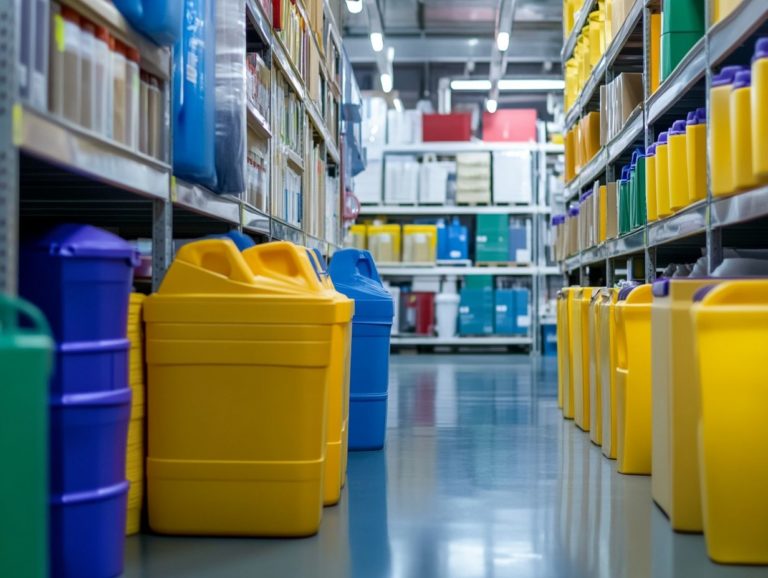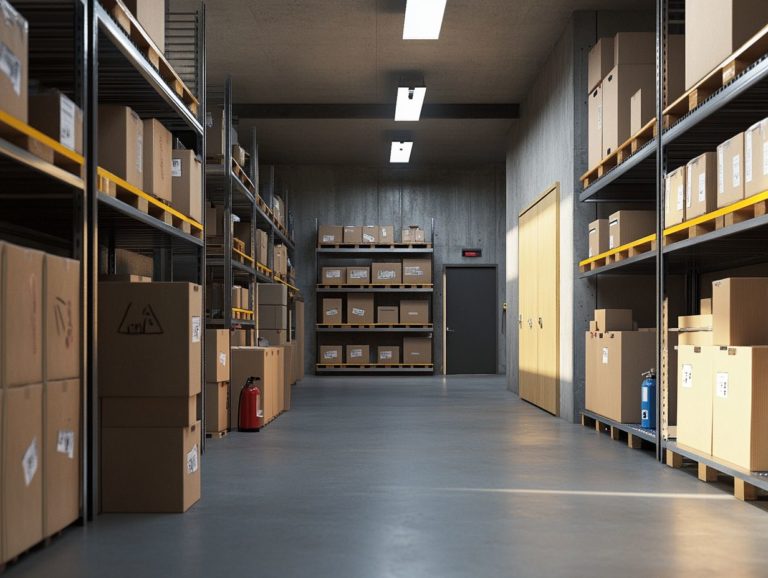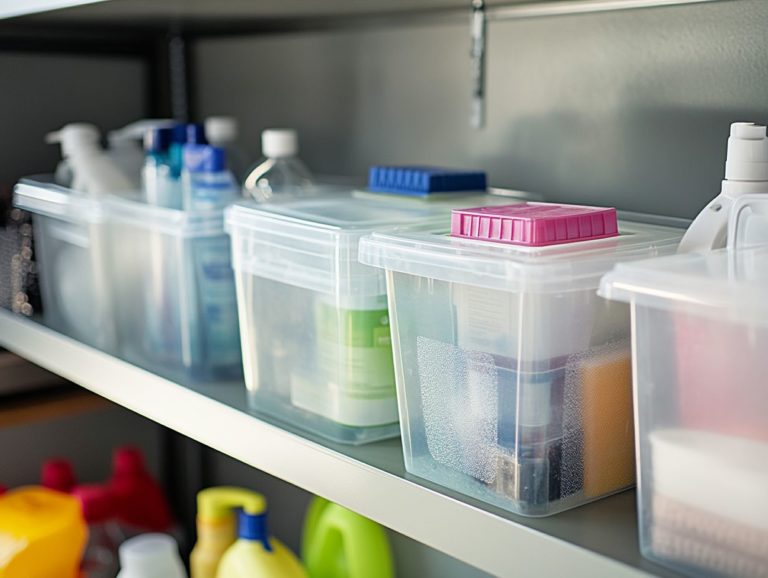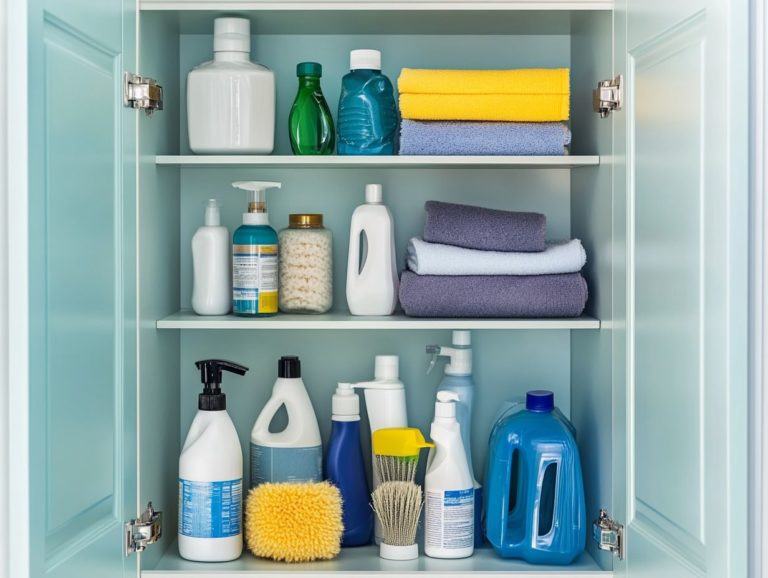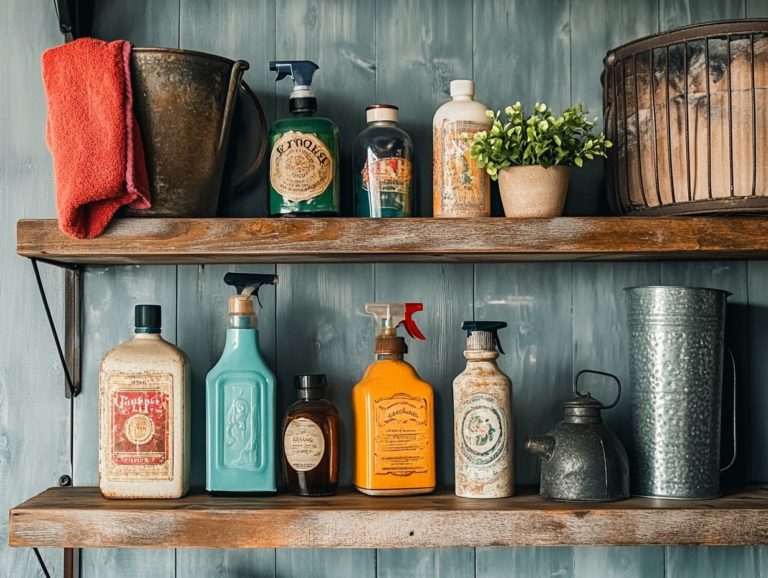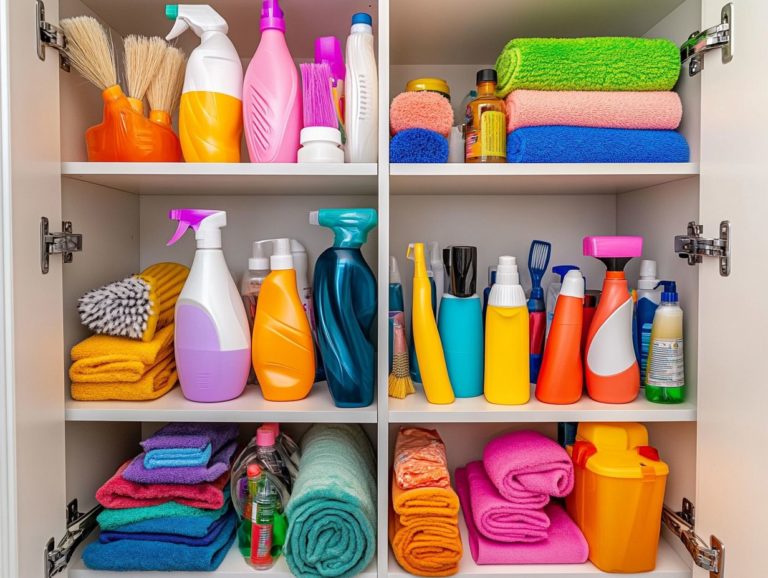Best Practices for Storing Homemade Cleaners
Transform your home into a fresh, green oasis with homemade cleaners! Homemade cleaners are not only eco-friendly but also cost-effective, giving you complete control over the ingredients that touch your home and family. Plus, they minimize the risk of toxic reactions and health hazards associated with conventional cleaning products.
This article delves into essential best practices for storing your DIY creations, ensuring they stay effective and safe for use. By utilizing airtight containers and proper labeling, you can significantly extend the shelf life of your homemade cleaners. Organizing cleaning supplies and incorporating effective storage solutions can make a big difference in maintaining your cleaning products’ efficacy.
You’ll also discover common ingredients and some clever cleaning tips to enhance their longevity. Join in as you simplify your cleaning routine and elevate your approach to a fresher, greener home by integrating homemade cleaning solutions and avoiding common cleaning mistakes.
Contents
- Key Takeaways:
- Why Use Homemade Cleaners?
- What Are the Best Practices for Storing Homemade Cleaners?
- What Are Some Common Ingredients in Homemade Cleaners?
- How Can You Make Homemade Cleaners Last Longer?
- Frequently Asked Questions
- What are the best practices for storing homemade cleaners?
- Why is it important to use airtight containers for storing homemade cleaners?
- What should I label on the containers of homemade cleaners?
- Where is the best place to store homemade cleaners?
- Why should homemade cleaners be kept out of reach of children and pets?
- How long can homemade cleaners be stored for? (Cleaning products expiration and safe storage)
Key Takeaways:
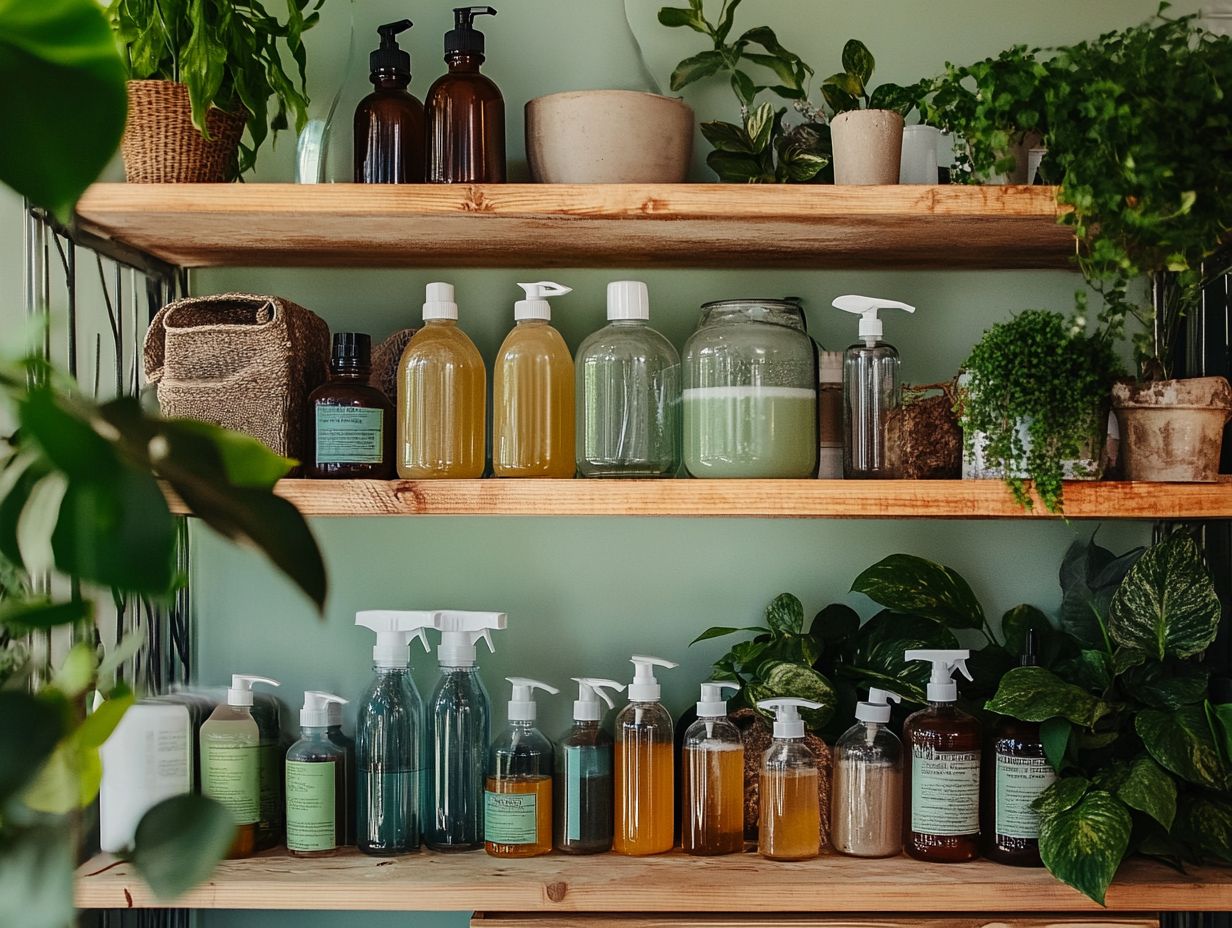
- Proper storage of homemade cleaners is crucial for their effectiveness and safety.
- Store cleaners in airtight containers, label them clearly, and keep them in a cool, dark place to ensure safe storage and maintain their effectiveness.
- Use purified water, store in smaller batches, and add natural preservatives to make homemade cleaners last longer.
- Organize your cabinets for easy access to your cleaning supplies.
- Employ professional organizer tips to maintain a clutter-free space for your household cleaners.
Why Use Homemade Cleaners?
Opting for homemade cleaners provides you with a sustainable and eco-friendly way to maintain a pristine home environment. This approach is supported by experts like Alexandra Kelly and organizations like Good Housekeeping. Unlike conventional cleaning products, which frequently harbor harsh chemicals capable of triggering toxic reactions and health hazards, homemade cleaners harness the power of natural ingredients like white vinegar, baking soda, and essential oils. These natural cleaners are also endorsed by organizations like Branch Basics and Better Homes & Gardens.
These alternatives not only reduce your exposure to harmful substances but also enhance indoor air quality, creating a healthier living space for you and your loved ones. Homemade cleaning solutions can effectively combat dirt and grime, just like traditional products, making them a wise choice for anyone looking to lessen their ecological footprint and improve air quality.
What Are the Best Practices for Storing Homemade Cleaners?
Storing your homemade cleaners properly is crucial for maintaining their effectiveness and ensuring safety in your home. Embrace best practices that keep your cleaning products both safe and effective while steering clear of any potential hazards linked to improper storage. This includes avoiding common cleaning mistakes and ensuring safe handling of all cleaning supplies.
By using airtight containers, clearly labeling each one, and placing them in a cool, dark location, you can significantly extend the shelf life of your cleaning solutions. Consulting a professional organizer can provide additional tips for maximizing your storage space. Moreover, keeping these products out of reach of children and pets is vital for preventing accidental exposure, allowing you to enjoy peace of mind in your environment.
Utilizing vertical space and under-sink storage can also help maximize your storage solutions. Don’t wait! Start making your home safer and cleaner today!
1. Use Airtight Containers
Using airtight containers is essential for storing your cleaning mixtures. This simple step prevents exposure to air and moisture, which can trigger changes that might make your cleaners less effective. Using container storage strategies can also enhance their longevity.
By opting for these effective storage methods, you can significantly extend the safe usage time of your products. This is especially important for DIY products that rely on natural ingredients. Your cleaning mixtures often contain natural ingredients that are sensitive to fluctuations in temperature and humidity. Airtight containers serve as a protective shield, reducing the risk of degradation and preserving the integrity of the components.
It s critical to keep an eye on your ingredients because if they break down, not only does the cleaning power diminish, but there’s also the potential for harmful reactions, resulting in unwanted byproducts. Regularly checking how long you can safely use these products can help avoid these issues. By ensuring these mixtures are stored properly, you can maximize their performance and safety during use.
2. Label Containers Clearly
Labeling your containers clearly is essential for enhancing organization and safety when storing your cleaning mixtures. This thoughtful approach not only helps maintain a clutter-free environment but also promotes ingredient transparency, allowing you to quickly identify the contents of each container. Ask a friend or look online for handy organizing tips.
By using clear labels, you can ensure that you re selecting products that are safe for specific surfaces and applications, minimizing the risk of misuse or contamination. Effective storage practices are crucial, as properly labeled containers assist you in tracking how long you can safely use your products and essential safety measures.
This ultimately fosters a proactive attitude toward household cleanliness and safety, ensuring you have a well-organized and secure space for your cleaning supplies. You ll love how easy it is to keep everything organized! Consider utilizing cleaning caddies for easy access to your multi-purpose cleaners, dusting spray, and all-purpose cleaner.
3. Store in a Cool, Dark Place
Proper storage is an essential part of seasonal cleaning and maintaining the longevity of your products. Storing your DIY products in a cool, dark place is essential for maintaining their effectiveness and preventing any unwanted chemical reactions that can arise from exposure to heat and light.
When your cleaning products are subjected to high temperatures or bright sunlight, their chemical compositions can start to break down, leading to diminished potency and overall effectiveness. For example, if you keep a vinegar-based cleaner too close to a heat source, it might lose its acidic qualities, resulting in a less effective solution for tackling grime.
This is a common mistake that can be avoided with proper storage. The same goes for the essential oils you incorporate into your DIY products; they can degrade quickly when exposed to sunlight, robbing you of their beneficial properties. Therefore, opting for storage solutions like opaque containers tucked away in a cabinet not only preserves the efficacy of these products but also extends their safe usage time.
This way, you can be confident that they ll perform as intended whenever you need them. Act now to ensure your cleaning products are always at their best!
4. Keep Out of Reach of Children and Pets
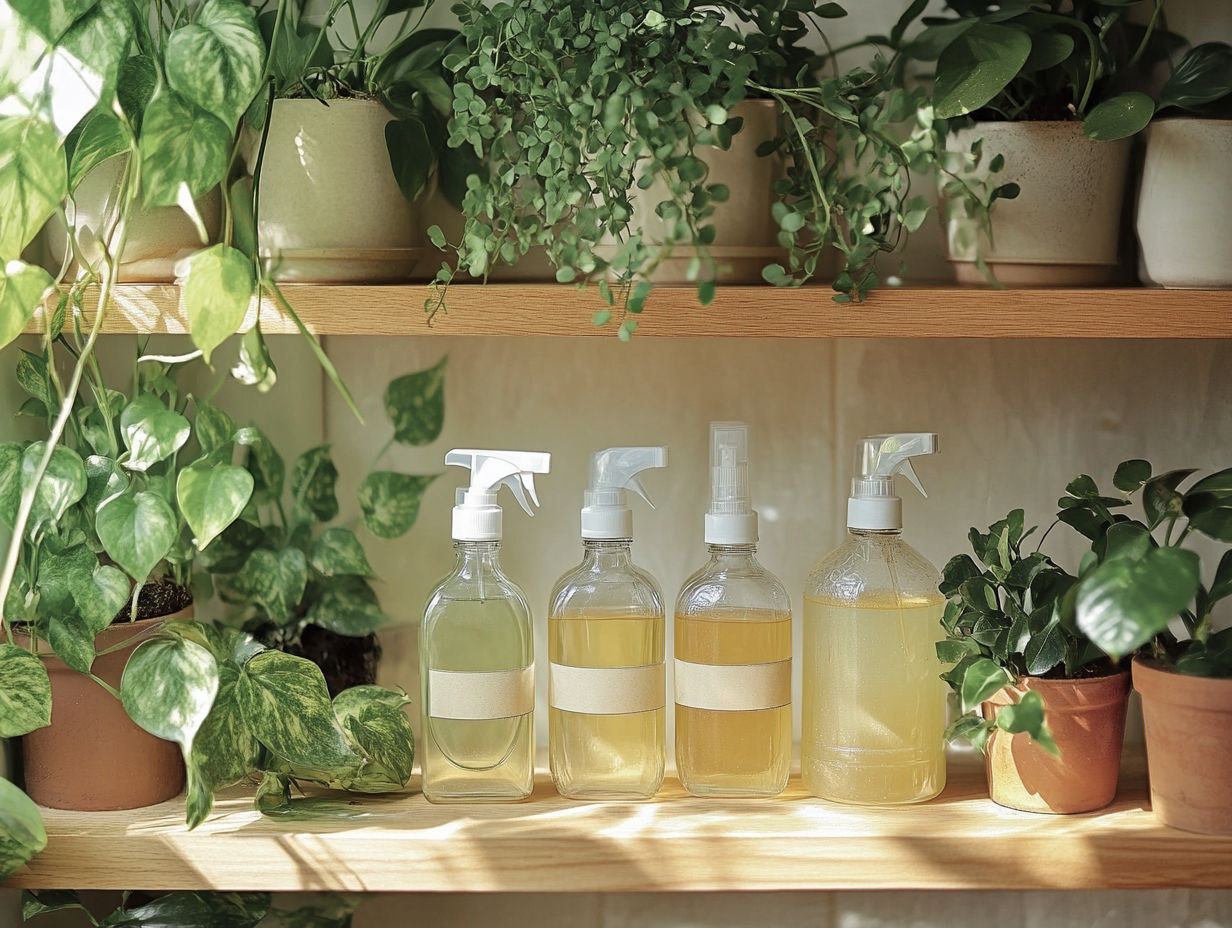
Following security measures like using childproof locks ensures safe storage.
Keeping your homemade cleaners out of reach of children and pets is a vital safety measure that safeguards the most vulnerable members of your household from potential health hazards linked to accidental exposure.
Beyond mere placement, you must consider the specific storage requirements for each type of cleaning product. For example, storing these substances in locked cabinets can significantly diminish the risk of unintentional access.
Employing childproof locks and clearly labeling all containers with safety warnings enhances security even further. Using clear bins can also help in organizing your cleaning supplies. Additionally, establishing a designated storage area in a well-ventilated space can help minimize the chance of harmful fumes accumulating.
By prioritizing effective storage solutions and routinely checking the integrity of your containers, you can create a safer environment while maintaining access to essential cleaning supplies. An interior decorator might also offer creative ideas for home organization, including proper storage for your cleaning tools.
5. Use Within a Reasonable Timeframe
Utilizing cleaning schedules can help you track product usage.
Using homemade cleaners within a reasonable timeframe is crucial for maintaining their effectiveness and avoiding any safety risks associated with expired products. Regularly updating your cleaning schedules can help keep track of when to use or replace your cleaning solutions.
Over time, the potency of certain ingredients in these cleaners like vinegar, hydrogen peroxide, and essential oils can diminish. A professional organizer can help you keep track of expiration dates to ensure you use your products while they are most effective. Take hydrogen peroxide, for example; this popular disinfectant breaks down into water and oxygen when exposed to light and heat, which significantly reduces its efficacy. Essential oils, too, may degrade over time, losing their antibacterial properties and delightful scents.
This degradation not only compromises the cleaning power of your homemade solutions but can also lead to unpleasant odors or unexpected chemical reactions. Therefore, it’s essential to use these DIY cleaners before their effectiveness wanes, ensuring you get the best results while keeping your space safe and fresh. Regularly consulting cleaning advice from experts like Nashia Baker and Martha Stewart can provide valuable insights.
What Are Some Common Ingredients in Homemade Cleaners?
Many of these ingredients are found in organic cleaners and promoted by experts like Malaika Lubega and Marilee Nelson.
Homemade cleaners present a delightful opportunity for you to embrace a safer cleaning routine with simple yet effective ingredients readily found in most households. Including cleaning supplies like all-purpose cleaner and multi-purpose cleaners can further enhance your cleaning strategies. By opting for common staples like white vinegar, baking soda, lemon juice, and essential oils, you not only harness remarkable cleaning power but also enjoy additional perks, such as refreshing fragrances and natural antimicrobial properties. These ingredients are often recommended in cleaning recipes shared by experts from Better Homes & Gardens and Good Housekeeping.
These versatile ingredients rise to the occasion, tackling a variety of cleaning challenges while fostering a healthier home environment, all without the risks associated with toxic chemical reactions.
1. White Vinegar
White vinegar is a truly versatile ingredient for your homemade cleaners. Its remarkable cleaning properties help cut through grease and grime.
This exceptional acidic solution has many uses in your cleaning routine. It tackles stubborn stains and neutralizes pesky odors that linger in your home.
Using vinegar can transform your cleaning strategies, as recommended by Greenway Carpet Cleaning. When you use white vinegar, you’re not just disinfecting surfaces like countertops and bathrooms; you’re also choosing a natural alternative to harsh chemicals found in commercial cleaners.
Its ability to break down mineral deposits makes it effective in kitchens and bathrooms. You can achieve a sparkling finish without the concern of toxic residues. Lawrence Berkeley National Laboratory recommends white vinegar for maintaining a healthier home environment.
If you prefer eco-friendly solutions, this ingredient is a fantastic addition to your cleaning arsenal. It allows you to showcase its effectiveness while contributing to a healthier environment.
Incorporating cleaning kits can help organize your homemade cleaning supplies efficiently.
2. Baking Soda
Baking soda is your secret weapon in homemade cleaners. It’s renowned for its mild abrasive properties, scrubbing surfaces without scratching them.
Its versatility goes beyond basic scrubbing. It’s excellent at deodorizing and eliminating stubborn stains, making it an invaluable asset in your natural cleaning toolkit.
This unassuming powder works wonders by neutralizing odors at their source. It refreshes everything from carpets and upholstery to your fridge.
Its gentle yet effective stain-removing prowess conquers marks on various surfaces, including countertops and clothing. By combining baking soda with vinegar or lemon juice, you can create powerful cleaning solutions using natural ingredients.
Ensure your home remains pristine and eco-friendly!
3. Lemon Juice
Lemon juice isn t just a delightful addition to your homemade cleaners; its natural acidity brings remarkable cleaning power.
This natural wonder acts like a gentle bleach, brightening surfaces and tackling stains without using harsh chemicals found in many commercial products.
With its antibacterial and antifungal properties (properties that help kill germs), lemon juice serves as an ideal disinfectant. It ensures your kitchens and bathrooms are spotless and free from harmful pathogens.
Integrating lemon juice into your cleaning routine means embracing a refreshing and eco-friendly alternative. It leaves your spaces sparkling and sanitized.
Choosing natural cleaners like lemon juice promotes a healthier environment while reducing exposure to synthetic chemicals. This makes it a smart choice for anyone seeking greener cleaning methods.
4. Essential Oils
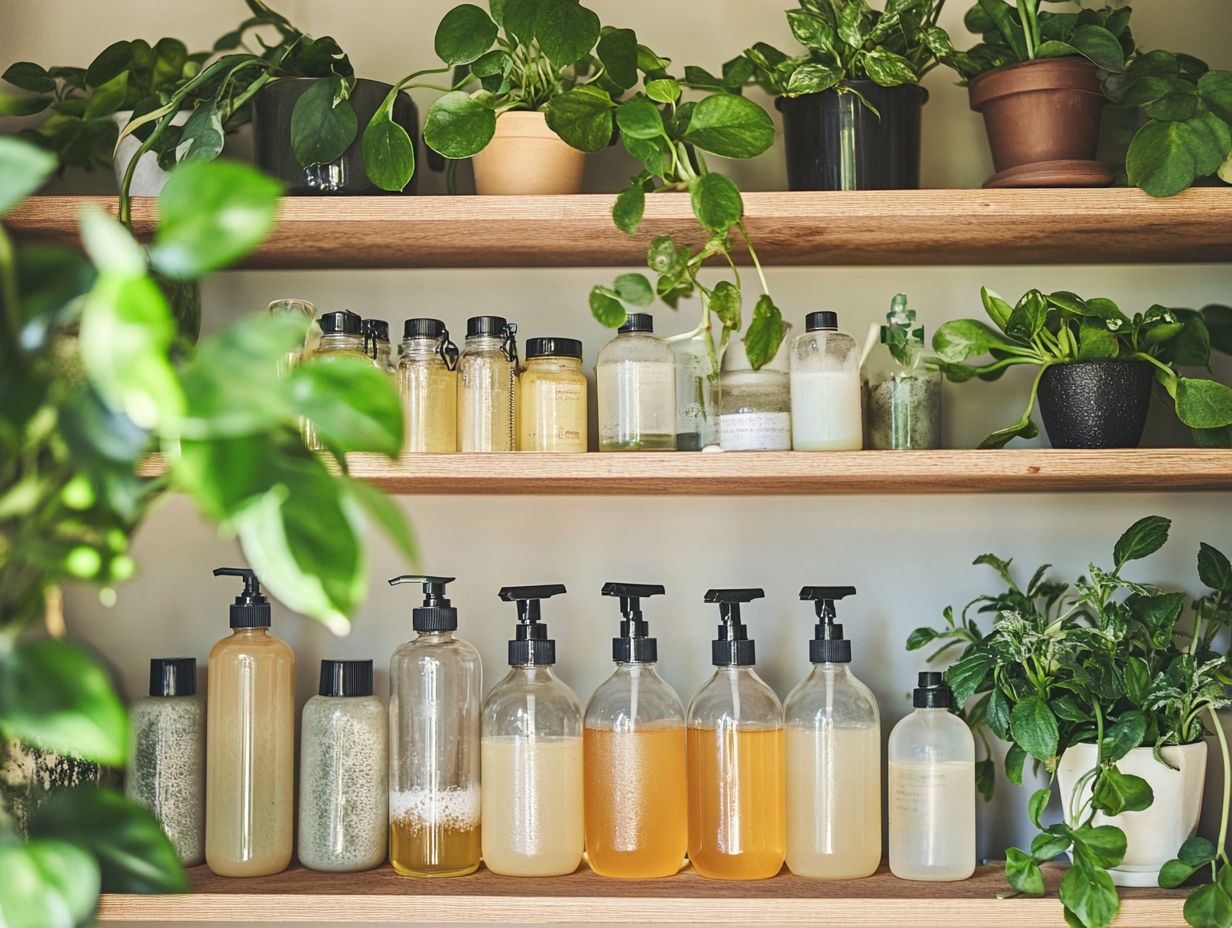
Essential oils can elevate your homemade cleaners. They add delightful natural fragrances while providing antimicrobial properties that enhance your cleaning solutions.
These aromatic oils, like tea tree, lavender, and lemon, serve a dual purpose: they uplift the ambiance of your space and help fight against bacteria and grime.
Take tea tree oil, for instance. Its renowned antibacterial and antifungal properties make it a fantastic addition to surface sprays or laundry detergents.
The soothing scent of lavender calms your mind and acts as a natural antiseptic, making it perfect for bathroom cleaners.
Let s not forget about lemon oil. Its bright citrus aroma masks unpleasant odors and cuts through grease, making it ideal for kitchen cleaning tasks.
By incorporating these essential oils, you can transform your cleaning routines into an enjoyable and eco-friendly experience. Try incorporating these methods today and see how they can revolutionize your cleaning routine!
How Can You Make Homemade Cleaners Last Longer?
To ensure your homemade cleaners stand the test of time while maintaining their effectiveness, it’s crucial to adopt specific strategies and storage techniques that preserve their quality.
Incorporating distilled water into your recipes can significantly minimize the risk of bacterial growth, thereby extending the shelf life of your cleaning solutions. Storing them in smaller batches allows for better management of expiration dates. Keeping ingredients separate until you’re ready to use them prevents premature degradation.
Using natural preservatives can enhance the longevity of your concoctions, ensuring that your homemade cleaners remain potent for all your cleaning needs.
1. Use Distilled Water
Using distilled water in your homemade cleaners is essential for boosting their effectiveness and extending their shelf life by minimizing the risk of bacterial growth.
This type of water is cleaned carefully to remove impurities, minerals, and contaminants commonly found in tap water. Unlike tap water, which can carry substances that might interfere with your cleaning solutions, distilled water guarantees a higher level of cleanliness.
By opting for distilled water, you can craft solutions that excel at breaking down dirt and grime while remaining free from residues that could compromise your cleaning efforts. Using pure ingredients is crucial, especially when you aim to maintain a healthy environment at home, particularly on surfaces that interact with food and your loved ones.
An exceptional cleaner made with distilled water allows for a seamless integration of other natural ingredients, maximizing cleanliness while ensuring safety.
2. Store in Smaller Batches
Storing homemade cleaners in smaller batches is a savvy strategy for managing expiration and ensuring your cleaning solutions retain their effectiveness.
Preparing these mixtures in limited quantities allows you to enjoy the benefits of fresh ingredients. Smaller amounts let you use the cleaner before it loses its potency, promoting effective cleaning. This approach minimizes waste and encourages experimentation with diverse recipes without the worry of leftover cleaners becoming less effective over time.
Smaller batches are easier to handle, making the cleaning process more convenient and adaptable to various tasks throughout your home.
3. Keep Ingredients Separate Until Use
Keeping your ingredients separate until you re ready to use them is a smart practice that helps maintain the potency of your homemade cleaners while minimizing the risk of unwanted chemical reactions.
Premixing ingredients can lead to a fade in effectiveness over time due to exposure to light, air, or moisture. This degradation can result in solutions that don t work as well as you d hoped. Combining ingredients might lead to unintended reactions, potentially releasing volatile compounds, which are substances that can evaporate easily and may be harmful.
4. Add Preservatives
Incorporating natural preservatives into your homemade cleaners can significantly enhance their longevity by inhibiting the growth of bacteria and mold. This ensures their effectiveness remains intact over time.
Popular choices include essential oils like tea tree and lavender, celebrated for their antimicrobial properties, along with vinegar, which serves as a powerful disinfectant and extends the shelf life of your cleaning products.
Try using these preservatives to supercharge your cleaning and create a solution that stays potent longer while fostering a healthier environment, free from harsh chemicals found in many commercial products.
Utilizing a combination of these preservatives can make your cleaning tasks not only more effective but also safer for both you and your pets.
5. Use Proper Storage Techniques
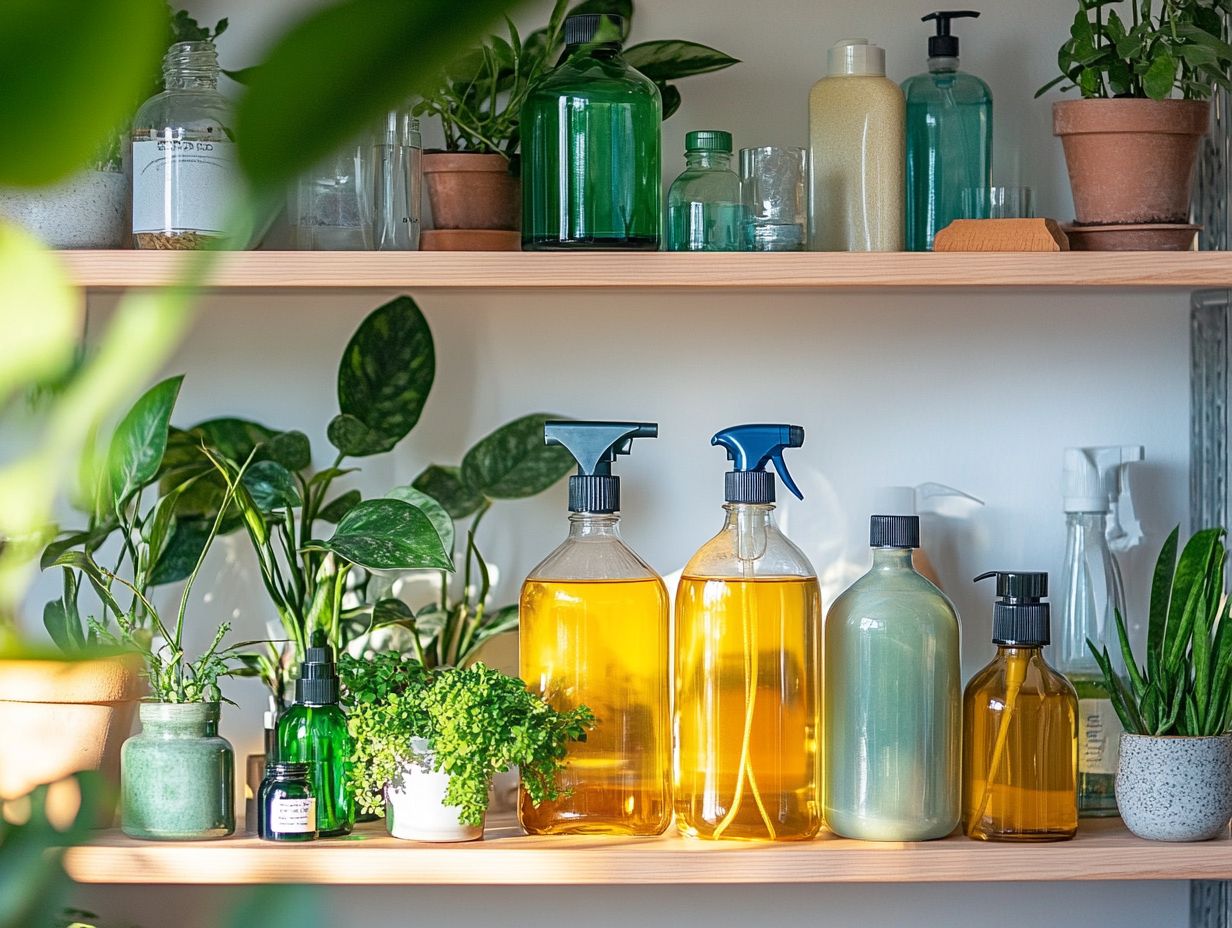
Proper storage techniques are key to keeping your homemade cleaners effective and lasting longer.
Select the right containers to protect your eco-friendly cleaners. Opt for glass jars or dark plastic bottles. They provide an excellent barrier against light and air two factors that could degrade your ingredients over time.
Make sure your storage area is cool and dry to prevent any unwelcome growth of bacteria or mold.
Label each container right away! This simple step helps you track freshness and effectiveness. Include the date of creation and the specific ingredients used.
By prioritizing appropriate storage practices, you can enjoy the benefits of your homemade cleaners for an extended period, ensuring they remain powerful and ready for use whenever you need them.
Frequently Asked Questions
What are the best practices for storing homemade cleaners?
The best practices for storing homemade cleaners include using airtight containers, labeling the containers with the ingredients and date, storing in a cool and dark place, and keeping them out of reach of children and pets.
Why is it important to use airtight containers for storing homemade cleaners?
Airtight containers stop air and moisture from getting in. This keeps your cleaners working well and stops germs from growing. It also helps to prevent spills and leaks.
What should I label on the containers of homemade cleaners?
It is important to label the containers with the ingredients used and the date the cleaner was made. This will ensure that you know what is in each container and when it was made, allowing you to use it before it expires.
Where is the best place to store homemade cleaners?
Homemade cleaners should be stored in a cool and dark place, away from direct sunlight and heat. This will help to maintain their potency and effectiveness.
Why should homemade cleaners be kept out of reach of children and pets?
Homemade cleaners often use natural ingredients, such as baking soda and white vinegar, but they can still be harmful if ingested or touched in large quantities. Keeping them out of reach of children and pets in a designated space like an under-sink cabinet will prevent any accidents from occurring. Consider using clear bins and proper storage solutions for safe handling.
How long can homemade cleaners be stored for? (Cleaning products expiration and safe storage)
The shelf life of homemade cleaners can vary depending on the ingredients used, such as essential oils or organic cleaners. It is recommended to use them within 3-6 months to ensure their effectiveness. Discard any cleaners that have changed color or smell strange. Consider labeling the containers with a date to manage their cleaning products expiration effectively.

